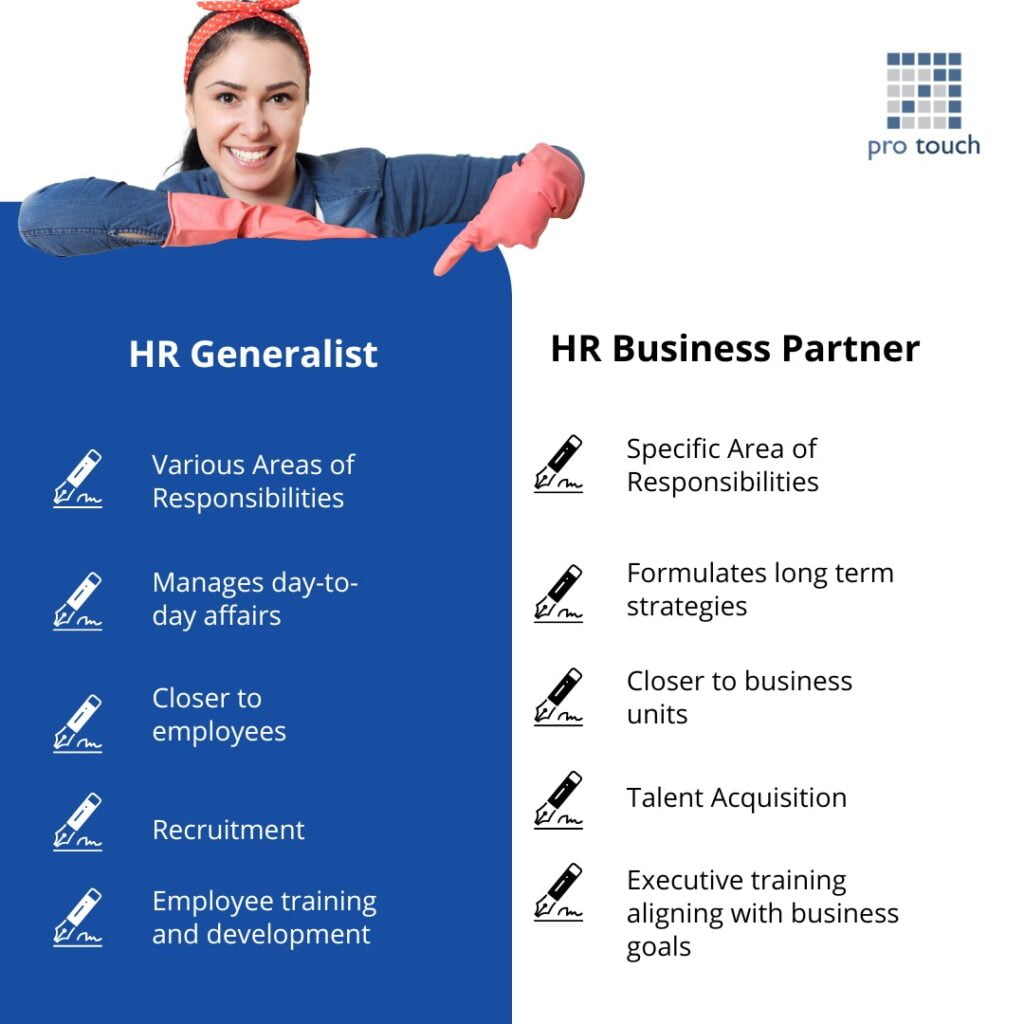When it comes to HR Practical Training, the difference between HR generalist and the HR business partner remains nightmarish for many aspiring HR Professionals. While both positions have important duties, the two roles are quite different from each other. Then what’s the difference?
In simple words, the HR generalist wears many hats. They handle a wide range of HR duties, from onboarding to policy creation to day-to-day administration. The HR business partner, on the other hand, is a specific role. They work with specific teams within the company and help them meet their business goals by providing support and guidance.
If you’re unsure which role is right for you, or if you’re simply curious about what each position entails, keep reading. In this article, we’ll break down the key differences between HR generalists and HR business partners.
What Is an HR Generalist?
An HR generalist is someone who focuses on the overall HR operations within a company. They handle tasks such as recruitment, employee relations, training and development, and employee onboarding. They typically don’t work in a specific area, but rather deal with all aspects of HR.
They act as a support system for the company’s HR department and work closely with the business partners in order to ensure that all HR functions are running smoothly.
What Is an HR Business Partner?
An HR business partner is a strategic member of the company who provides counsel and advice to the CEO and senior management on issues relating to human resources. They work with business units to ensure that the HR strategy of the company is aligned with the business strategy, and they are responsible for developing and implementing policies and procedures that will enable the company to attract, retain and motivate the best talent as per the business goals of the company.
Key Differences Between HR Generalist & HR Business Partner
There are a few key differences between HR generalists and HR business partners.
The first is their area of operations. HR generalists are responsible for all aspects of HR, from recruiting to benefits administration to policy development. HR business partners, on the other hand, are focused specifically on supporting the business by aligning employee needs with business goals and objectives.
Another difference is their level of experience. Most HR generalists have less than five years of experience, while HR business partners usually have at least five years of experience in HR and another five years in a business role.
Finally, their roles also vary in terms of decision-making authority. HR generalists typically make recommendations to management, while HR business partners have the authority to make decisions about hiring, firing and other key personnel decisions.

Skills Required of an HR Generalist
No matter where you choose to go down the HR pathway, there are some key skills that you’ll need to possess in order to be successful. So what do HR generalists require in order to excel?
The first is knowledge of human resources principles and practices. This means understanding employment law, administering employee benefits, and overseeing recruitment activities.
In addition to this, an understanding of organizational development concepts and techniques is essential. This includes the ability to assess organizational structure and design, understand job analysis and performance evaluation techniques, as well as develop performance standards.
Finally, HR generalists need excellent communication skills both written and verbal, so they can effectively interact with all levels of their organization. Additionally, navigating interpersonal relationships between staff members is a must if they want to succeed in their role.
Skills Required of an HR Business Partner
As an HR Business Partner, you need to be able to see the bigger picture and anticipate the various effects of changes on the organization. You must be able to analyze data and be good at problem-solving. You should also have a deep understanding of the particular industry and its regulatory environment, so that you can provide solutions that comply with local laws.
HR Business Partners also need to be highly collaborative, as they work closely with stakeholders at all levels. Communication and influencing skills are essential, as you will be speaking with everyone from the C-suite down. This will require not only having a good understanding of different management styles, but also having a knack for diplomacy and people skills. It’s important that you are comfortable working independently as well as part of a team.
Lastly, you should also be someone who is very organized and can multitask efficiently while managing competing priorities.
Real-World Domain of a HR Generalist & a HR Business Partner
Now that you know the differences between HR Generalists and HR Business Partners, let’s look at a few real-world examples of what these roles might look like in practice.
A HR Generalist is likely to be involved in more administrative tasks such as handling payroll, employee onboarding and health benefits implementation. They may also be involved in recruitment and training programs, as well as providing guidance on labor laws.
On the other hand, a HR Business Partner is more likely to have a bigger focus on strategic planning arranging business goals with HR practices. They would focus on helping departments grow by identifying areas of improvement and opportunities to innovate. They could also assist with people management activities such as performance reviews and developing career paths for employees within the organization.
Conclusion
In short, an HR generalist is responsible for a wider range of HR activities, whereas an HR business partner is more focused on strategic HR initiatives and working with line managers. So, if you’re wondering which role is better suited to you, it’s important to think about the specific areas you’re interested in and the type of organization you want to work for.
So next time when you go to choose an HR Courses for yourself, don’t forget to ensure that your Hr Certification provider makes you understand this crucial concept in depth.





Leave a Reply